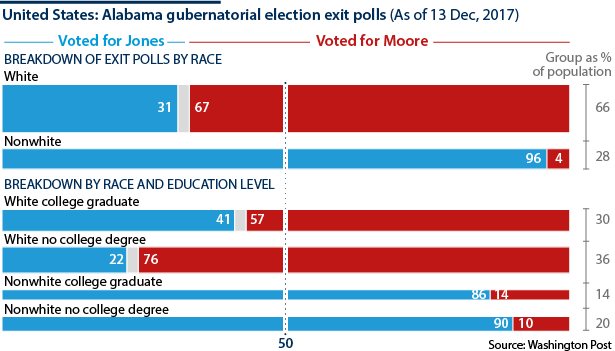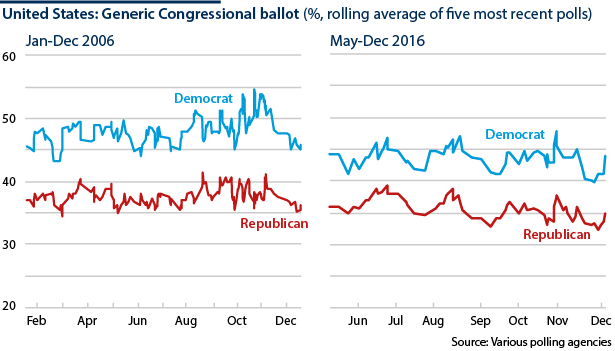US Democratic resurgence may come in 2018 post-Alabama
Extraordinary election result will energise Democrats for midterms and exacerbate divisions within Republican ranks
Democratic candidate Doug Jones yesterday won the Senate special election in Alabama, defeating Republican Roy Moore with 49.9% of the vote to Moore’s 48.4%. Moore’s candidacy was problematic, so his loss was always possible. However, Republican US President Donald Trump won Alabama by 28 percentage points (pp) over his Democratic rival in 2016, and traditionally Alabama is considered particularly inelastic in its partisan split -- a Democrat had not won election to the Senate from Alabama this century.
What next
Jones will reportedly be seated after the current legislative session ends on December 22. Thus, he may miss voting on the final Trump administration tax bill and government spending package. However, his election may be taken as a signal to wavering Republicans to hold off on immediate passage of these measures, while resolving differences in the preliminary House and Senate versions may prompt delays regardless. Some Republican senators may reverse support, causing the bill’s withdrawal. Whichever way the tax bill proceeds, Jones’s win signals that Democrats could pick up enough seats in 2018 to win the House and possibly the Senate. That may prompt Republicans to pivot towards more popular policies such as an infrastructure bill.
Subsidiary Impacts
- Moore may push for a recount of the vote; postal votes can be accepted up to seven days after the election.
- New infrastructure would have positive economic effects, but these benefits (and the political ones) would take time coming.
- If Republican congressmen feel politically threatened, talk of impeaching Trump might intensify.
Analysis
Moore had twice been removed from the Alabama Supreme Court for defying court orders. The former judge also garnered the opposition of Richard Shelby, Alabama's other senator (also a Republican). Moore also faced various allegations -- which he denies -- of sexual misconduct.
The Alabama result's national implications are thus somewhat obscured by the unique nature of Moore's candidacy. Republican and Democratic strategists will now want to untangle how much of Jones's performance against the state's solid Republican lean was down to his merits and the Democratic label, and thus how much is the result of a national mood that could be repeated elsewhere.
49.9%
Vote share taken by Democrat Doug JonesSenatorial samples
While Alabama is not a sufficiently large size to be predictive, it does reinforce trends that have been apparent in elections in 2017.
Even before the allegations against Moore were reported, Jones was overperforming the usual Democratic performance in Alabama by about 20 pp. That is roughly in line with the average 16-pp swing towards the Democrats in special elections in 2017 and Democrats' victories in Virginia and New Jersey in November.
This indicates that the national shift towards Democrats was sufficient to make the race competitive, a feat in Alabama. Concerted turnout efforts among the state's African-American community, low enthusiasm among deeply conservative Republican voters and a higher-than-expected vote share of white voters with college degrees appear to be the factors that tipped the race.
2018 elections
The psephological indications are that the Democrats will win the House of Representatives in 2018 mid-term elections, and now, perhaps, the Senate.
Two of the most significant predictors of mid-term election results are the presidential approval rating and the generic congressional ballot. Currently, Trump has the lowest ratings of any president in modern history at this point in his presidency, at 37% approval and 57% disapproval. The generic congressional ballot favours the Democrats by 10 pp.
For comparison with two of the largest mid-term opposition party waves in recent decades, in 1994, former Democratic President Bill Clinton's party would lose nine Senate seats and 54 House seats with a 41% approval rating at this time in his presidency. In 2006, during the Republican George W Bush presidency, Democrats picked up six Senate and 31 House seats with a generic ballot advantage of 11.5 pp.
Therefore, with the caveat that the elections are still eleven months away, it is likely that Democrats will control at least one branch of government in January 2019.
The 2018 mid-terms could see the Democrats resurgent
Tax bill
The House and Senate passed their versions of a tax bill earlier this month and are currently in reconciliation committee to produce a bill that can be voted into law. The final version of the bill is reportedly being planned for a vote sometime next week (see PROSPECTS 2018: US politics - November 6, 2017).
The bill's specific provisions await announcement, but its basic structure appears clear. The bill would reduce the corporate tax rate to around 20%, eliminate deductions to the detriment of middle-income taxpayers and add 1.0-1.5 trillion dollars to the national debt over the next decade.
Passage of the final version is not assured; prediction markets put the probability at around 70%. Three major obstacles to passage lie in the Senate:
Byrd rule
To pass legislation on a 51-vote majority (the Republicans will hold 51 of 100 Senate seats after Jones is seated) rather than a 60-vote threshold, the Senate parliamentarian must rule that the bill meets a series of requirements known as the Byrd rule.
It is uncertain whether the new bill will meet these requirements, and Democrats may push for further revisions. Republicans may overrule Democrats, but doing so will likely cause delays.
Broken agreements
Senators Susan Collins and Jeff Flake voted for the initial version of the bill on the backs of side agreements that the White House and House of Representatives have been reticent to endorse. These two votes, with Senator Bob Corker, who has already announced his opposition, would be sufficient to vote down the bill if they believe their agreements will not be upheld.
'Jones effect'
The tax bill is one of the least popular pieces of legislation in polling history; only 32% of the public support it.
Rhetoric from the bill's supporters indicates that it has been crafted to satisfy the Republican party's donors and core voters; the calculation is that the tax bill will help Republicans consolidate the party base and have minimal effect on midterm elections.
However, Republican politicians may see the Jones victory as an indication that their party's popularity is at risk, and may defer action on the tax bill. On balance, however, momentum behind the tax bill is strong because of Republicans' desire to pass a significant piece of legislation, and it is likely to pass. However, the likelihood has dropped since yesterday, and given the other possible sources of delay. Representatives in competitive districts in 2018 could also be concerned.
Revamped agenda
Jones's election makes it more likely that Congress will attempt to turn to more popular legislation in 2018 that they believe may receive bipartisan support since Senate Republicans have a wafer-thin majority.
If congressional Republicans attempt this legislative shift, the most likely issue to come up will be infrastructure (see UNITED STATES: Congress battles may jeopardise PPPs - July 25, 2017). Increased infrastructure spending has the support of both parties and the White House.
However, the tax bill would increase the projected deficit substantially, and Speaker of the House Paul Ryan has indicated that he plans next to move onto cutting domestic spending. Any move towards a new agenda would be the result of internal divisions, and there would be weeks of indications that House Republicans are debating a new strategy.


